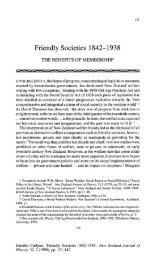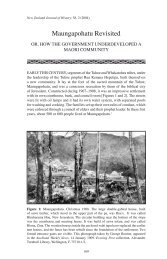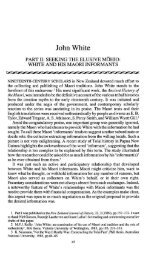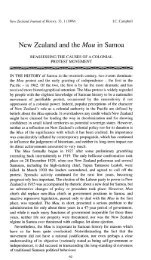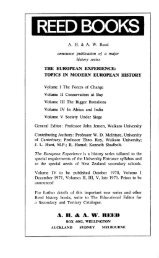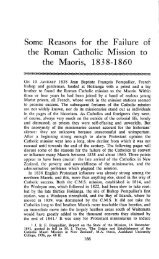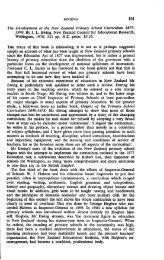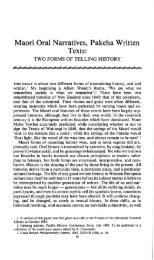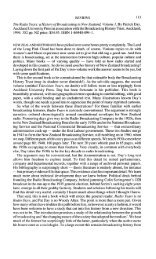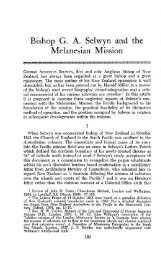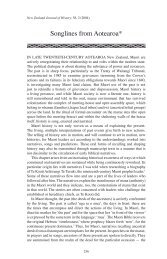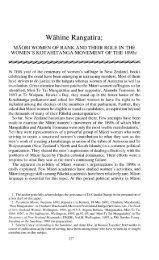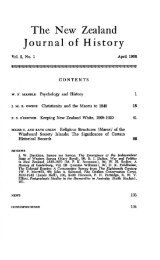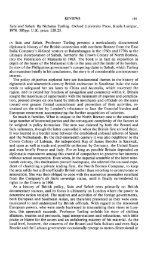Irish Migration to the West Coast, 1864-1900 - New Zealand Journal ...
Irish Migration to the West Coast, 1864-1900 - New Zealand Journal ...
Irish Migration to the West Coast, 1864-1900 - New Zealand Journal ...
Create successful ePaper yourself
Turn your PDF publications into a flip-book with our unique Google optimized e-Paper software.
LYNDON FRASER<br />
In ano<strong>the</strong>r case, <strong>the</strong> <strong>New</strong> <strong>Zealand</strong> nomination system was reshaped <strong>to</strong><br />
accommodate familial connections in eastern Australia. Ellen Connell, <strong>the</strong><br />
proprietress of <strong>West</strong>port's City Hotel, paid a deposit for <strong>the</strong> passages of her<br />
sister, bro<strong>the</strong>r and fa<strong>the</strong>r, who sailed <strong>to</strong> Nelson on <strong>the</strong> Mataura in 1875. After<br />
<strong>the</strong> vessel's arrival, she removed all three <strong>to</strong> lodgings in <strong>the</strong> <strong>to</strong>wn and proceeded<br />
<strong>to</strong> arrange <strong>the</strong>ir departure for Melbourne aboard <strong>the</strong> Albion. Nelson's immigration<br />
officer, Charles Elliot, reported that Connell's fa<strong>the</strong>r had no idea that he was<br />
expected <strong>to</strong> continue on <strong>to</strong> Vic<strong>to</strong>ria and, in fact, signed a promissory note for<br />
£16 <strong>to</strong> cover <strong>the</strong> costs of his voyage. 65 In her own testimony, Ellen Connell<br />
claimed he 'went <strong>to</strong> Melbourne <strong>to</strong> see more children of his and he and bro<strong>the</strong>r<br />
intend comming back <strong>to</strong> me', while her sister, Johanna, remained in <strong>West</strong>port.<br />
Fur<strong>the</strong>rmore, her financial circumstances were such that an immediate payment<br />
of <strong>the</strong> outstanding fares would cause severe hardship. 66 Subsequent letters<br />
indicate that Ellen Connell's actions were not intentionally fraudulent. 67 Instead,<br />
it seems likely that she did not fully comprehend <strong>the</strong> significance of <strong>the</strong> political<br />
and administrative boundaries framing colonial immigration policies. Johanna<br />
Connell's eventual departure '<strong>to</strong> keep house' for her fa<strong>the</strong>r in Melbourne and<br />
Ellen's willingness <strong>to</strong> reimburse <strong>the</strong> state for passage money owed by relatives<br />
forcefully reminds us that familial obligations regularly extended across <strong>the</strong><br />
Tasman.<br />
The function of informal social networks in structuring <strong>the</strong> flow of migrants<br />
in<strong>to</strong> <strong>West</strong>land and south-west Nelson is fur<strong>the</strong>r illuminated by information<br />
adduced from probate records. 68 An examination of surviving testaments from<br />
<strong>the</strong> <strong>West</strong> <strong>Coast</strong> for <strong>the</strong> period 1865-1910 suggests that <strong>Irish</strong> movement <strong>to</strong> <strong>the</strong><br />
region was a collective ra<strong>the</strong>r than individual enterprise. 69 Although some<br />
newcomers travelled independently, a substantial majority were reliant on<br />
kinsfolk and friends for information, advice and material assistance during <strong>the</strong><br />
process of migration and settlement. This pattern held true even for <strong>the</strong> most<br />
restless migrants and found expression in <strong>the</strong> execu<strong>to</strong>rships created by <strong>Irish</strong><br />
testa<strong>to</strong>rs.<br />
One of <strong>the</strong> most critical decisions facing a person making a will was <strong>the</strong><br />
choice of suitable execu<strong>to</strong>rs <strong>to</strong> administer <strong>the</strong> estate and carry out <strong>the</strong> wishes<br />
expressed in <strong>the</strong> testament. We may surmise that <strong>the</strong> resolution of this question<br />
in favour of certain named individuals implies a relationship of trust between a<br />
testa<strong>to</strong>r and those selected. Conversely, a lack of recognition <strong>to</strong>ward^'«S<strong>the</strong>rs<br />
who might have been given this responsibility suggests <strong>the</strong>y were thought less<br />
capable of managing <strong>the</strong> deceased's worldly affairs. It is significant that among<br />
single <strong>Irish</strong> males, more than three-fifths of all testa<strong>to</strong>rs chose <strong>to</strong> appoint<br />
expatriate neighbours or acquaintances as execu<strong>to</strong>rs of <strong>the</strong>ir estates (63.6%). A<br />
substantial minority entrusted kinsfolk with this responsibility (19.3%), while<br />
many made use of local s<strong>to</strong>rekeepers, priests, or merchants in joint partnership<br />
with friends.<br />
The testamentary preferences of widowed adults closely matched those of<br />
single men in terms of property management. 70 Bridget Houlahan of<br />
Dillmans<strong>to</strong>wn, for example, named a parish priest, Matthias McManus, and an<br />
<strong>Irish</strong> Catholic s<strong>to</strong>reman, John Crowley, as joint trustees and guardians of her<br />
three infant children. 71 Similarly, Leinster-born James Jones considered his<br />
execu<strong>to</strong>rs, Bernard Ward and Patrick Dee, sufficiently trustworthy <strong>to</strong> administer<br />
214



